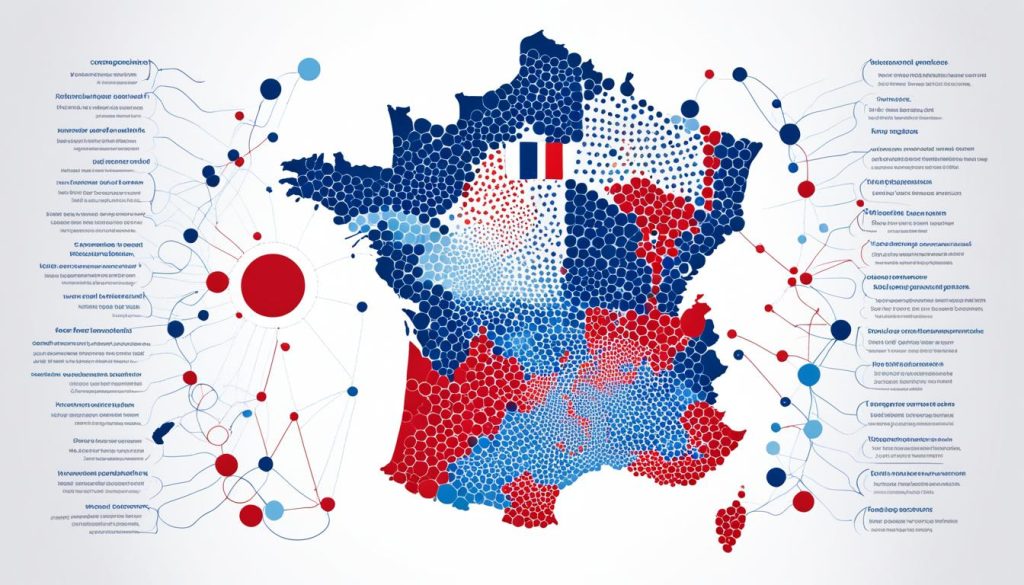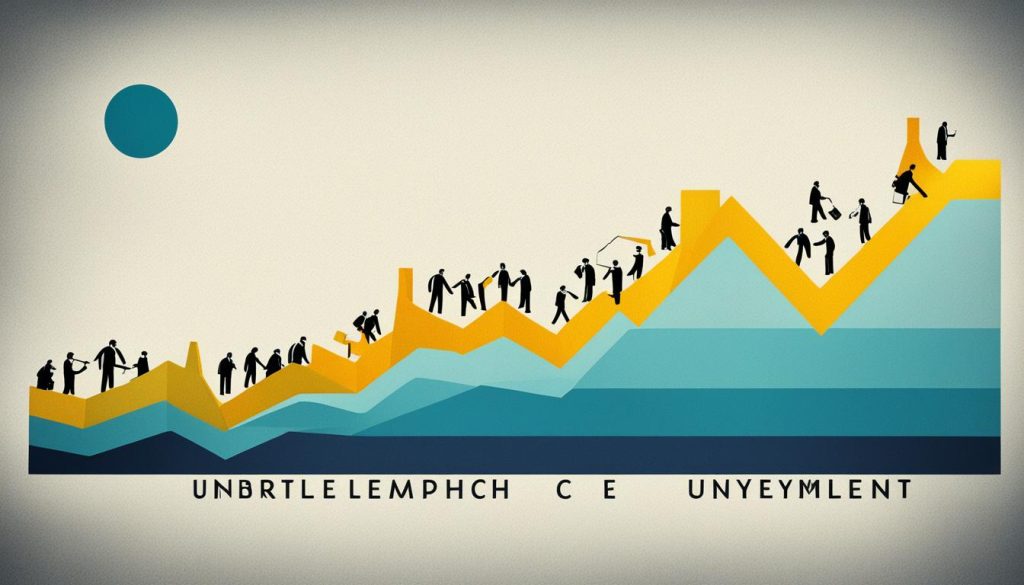France has seen its unemployment rates go up and down from 1991 to 2022. This shows how the country’s job landscape changes with new economic policies and shifts in the global market. Such variations tell a story of a job market that’s always evolving, shaped by forces both within and beyond France.
- Introduction to France’s Unemployment Trends
- Impact of Economic Cycles on Unemployment
- Regional Variations in Unemployment Rates
- Labour Market Dynamics
- Reasons Behind Unemployment Rate Fluctuations
- The Role of Government Interventions
- France Has Seen Fluctuating Unemployment Rates
- Comparative Analysis with European Neighbours
- Future Projections and Challenges
- Source Links
Key Takeaways
- France’s unemployment rates have fluctuated considerably from 1991 to 2022.
- Economic policies and global economic influences play critical roles in these fluctuations.
- France’s job market dynamics reflect broader employment trends.
- The complex nature of French unemployment data offers insights into the nation’s economic health.
- Understanding these fluctuations is key to addressing future employment challenges.
Introduction to France’s Unemployment Trends

To grasp the change in France’s job market, we must look at its history and the economic policies at play. The joblessness rates in France have varied greatly in recent times. This deep dive into history helps us see how economic decisions affect unemployment.
Historical Perspective (1991-2022)
From 1991 to 2022, France’s jobless rates tell a story. The early ’90s brought hard times and high unemployment. Yet, by the late ’90s, things looked up before the 2008 crisis pushed rates up again. Looking at these ups and downs shows how France’s job market reacts to different pressures.
The Role of Economic Policies
Economic strategies have significantly influenced France’s jobless rate.
Reforms, fiscal measures, and government actions all aimed to boost employment. For example, the 35-hour workweek and job protection laws impacted job rates notably. Reviewing these moves shows their effects on the job market’s stability through the years.
Impact of Economic Cycles on Unemployment

The employment scene in France is closely tied to economic up and downs. These cycles, with their growth and contraction phases, directly affect job markets. They help us see how unemployment in France changes due to local and global factors.
Boom and Bust Cycles
In France, boom and bust cycles are key in determining unemployment rates. When the economy is booming, jobs are plentiful and unemployment falls. But when the economy slows, jobs vanish, and more people are out of work. The recent global recession made this quite clear with a sharp rise in unemployed folks.
This cycle doesn’t just change the number of jobs. It also impacts how good those jobs are, what they pay, and how people feel about their work. In good times, companies might offer better pay and benefits. In bad times, they may cut costs, which can mean lower wages and job cuts.
Global Economic Influences
The global market also plays a big role in France’s unemployment rates. Problems in major trading partners, investment shifts, and policy changes worldwide can affect French jobs. The European debt crisis and recent global slowdown are perfect examples of how linked our economies are.
It’s crucial for those making economic policies to understand these global influences. This knowledge is vital for building strategies that can withstand world market shifts. Being aware of global trends helps in keeping domestic employment stable.
Regional Variations in Unemployment Rates

In France, it’s key to grasp how unemployment varies by region. This understanding helps tackle economic inequality. The contrast is sharp between city areas and remote regions. A notable example is La Réunion, facing unique job market struggles.
Metropolitan France vs. La Réunion
Job prospects differ greatly between metropolitan France and La Réunion. The former has a wide industry range and strong economic support. But La Réunion deals with high jobless rates due to its isolated location, affecting economic growth.
Factors Contributing to Regional Disparities
Many elements cause regional unemployment differences. One major factor is each region’s economic setup. While metropolitan France thrives on diverse industries and investments, La Réunion relies mainly on tourism and farming. La Réunion’s labour market also suffers because of its higher youth unemployment, adding to the challenge. Solving these issues needs focused policies and creative ideas to improve jobs everywhere.
Labour Market Dynamics

France is changing a lot these days, especially in work life. This has led to big changes in who can work and how old they are.
Changes in Labour Market Participation
The number of people working in France is changing because of new policies and technologies. This has led to different kinds of jobs that aren’t your usual 9-to-5. It shows how the French work scene is evolving, impacting people’s interest in jobs.
Impact on Various Age Groups
Different ages are being affected in unique ways. Young people find it tough to get steady jobs, turning to short-term or freelance work. On the other side, older folks might struggle with new tech, making it hard for them to stay in or rejoin the workforce. These changes underline the importance of policies aimed at all ages to strengthen France’s job market.
Reasons Behind Unemployment Rate Fluctuations
Unemployment rates in France change due to industry trends and job traits in various sectors. We gain insight into why jobs come and go by looking at these aspects.
Industry-Specific Trends
Different fields affect employment in many ways. For example, in fast-growing areas like tech and healthcare, there are often more jobs. This is due to new inventions and a constant need for skilled workers. Yet, in traditional manufacturing, jobs might decrease when the economy struggles, raising the unemployment rate.
- Emerging industries often lead to increased employment opportunities.
- Established sectors may experience downturns impacting overall job stability.
Employment in High vs. Low Value-Added Sectors
The difference between high and low value-added sectors plays a big part in employment trends. High-value sectors, like finance, technology, and professional services, maintain steady jobs because of their high productivity and economic impact. But, sectors with lower value, such as retail and some manufacturing, face more job losses when the economy changes.
Jobs in high-value areas tend to be more secure and offer better growth chances. On the flip side, low-value sectors have a harder time keeping jobs stable, especially in tough economic times.
- High-value sectors: Finance, Technology, Professional services
- Low-value sectors: Retail, Low-end Manufacturing
To reduce unemployment in France, it’s key to understand the relationship between industry trends and jobs across sectors. By keeping an eye on these factors, policymakers can create a more steady job market.
The Role of Government Interventions
The French government plays a key role in fighting unemployment through various strategies. It has developed policies to make the job market better. A major part of their work is doing policy reforms to help create more jobs.
One effective strategy is giving subsidies to companies that hire people unemployed for a long time. This approach helps people get jobs quickly. It also boosts the economy by encouraging companies to be more active.
Training programmes are also vital in the government’s efforts. These programmes aim to equip workers with new skills. This makes it easier for job seekers to find work, especially in sectors lacking skilled workers.
The government also helps entrepreneurs and small business owners. It provides money and guidance to help start new businesses. This creates more job opportunities.
In summary, French unemployment policies include policy reforms, subsidies, training, and support for startups. These efforts are crucial for the country’s economic growth. They help in making sure people have jobs.
France Has Seen Fluctuating Unemployment Rates
In France, it’s clear that unemployment rates often change. This requires constant unemployment rate analysis. It helps us figure out why these changes happen and their impact on the economy. By looking at the job market closely, those in charge can plan how to manage the ups and downs of unemployment.
The job market in France has changed a lot due to policy and global economy shifts. These changes show the bigger picture of economic health and highlight the need for smart policy decisions to lessen the unemployment effects. Being able to adjust to new situations by keeping a close eye on unemployment can lead to a more stable job scene.
Evaluating the job market carefully helps everyone understand how to reduce unemployment’s negative side effects and build a strong job market. This strategy means policies need to be forward-thinking, tackling the main reasons for unemployment. This deep understanding is essential for creating plans that keep people working and improve job levels in France.
Comparative Analysis with European Neighbours
Studying the European labour market is fascinating, especially when we look at employment rates in different countries. Through a detailed EU employment comparison, we can see how various economic policies affect work opportunities. This helps us grasp the effects of each country’s strategies.
Employment Rates in the EU
Employment rates in the EU vary widely due to factors like economic health, key industries, and government policies. Germany, for instance, has high employment thanks to its powerful industry. On the other hand, Greece struggles with joblessness because of economic troubles and big changes. An EU employment comparison shows these differences and the reasons behind them.
Economic Policies in Different Countries
Economic policies greatly influence employment across Europe. Denmark’s “flexicurity” model, which combines flexibility with job security, leads to better job rates. But, countries with strict labour laws often face higher unemployment. Looking at these policies helps us understand what works and what doesn’t for creating jobs.
Finally, learning about how different economic tactics affect job rates offers deep insights. It tells us a lot about the European labour market’s ins and outs. This knowledge is key for coming up with better policies in the future.
Future Projections and Challenges
The future of jobs in France looks complex due to many factors. These include economic shifts and technology growth. The world economy’s ups and downs will affect France’s future. Experts think that automation and digital changes will impact jobs for years. France needs to prepare for these labour market challenges.
People getting older also affects job forecasts in France. There’s more pressure on the working-age group to support the economy. Plus, as the population ages, some sectors may face skill shortages. It’s vital for policymakers to keep these trends in mind. They must work to create more jobs and keep employment steady.
Technological progress offers chances for innovation but may displace some jobs. As machines do routine tasks, industries needing digital skills will benefit. This means France must focus on retraining workers. A balanced approach is key to a bright economic future. Through solid policies, France can tackle these challenges. This way, it can grow and create more jobs.












